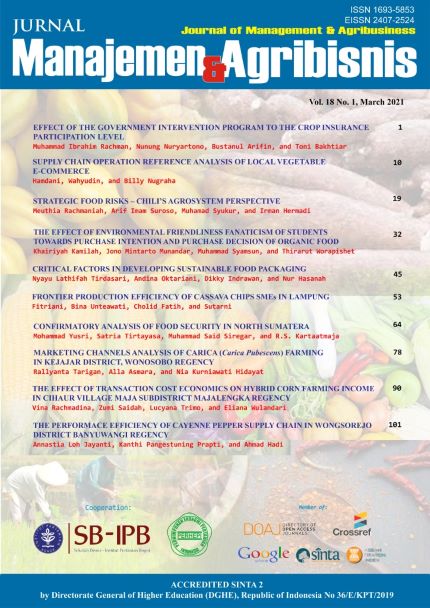THE EFFECT OF TRANSACTION COST ECONOMICS ON HYBRID CORN FARMING INCOME IN CIHAUR VILLAGE MAJA SUBDISTRICT MAJALENGKA REGENCY
Abstract
Transaction costs on corn farming can affect the income of corn farming. This research aimed to identify the transaction cost economics (TCE) structure and analyze the effect of TCE on the income of hybrid corn farming. The research method used is TCE analysis and multiple linear regression analysis. This research was conducted in Cihaur Village, Maja Subdistrict, Majalengka Regency, West Java, on 64 respondents. The research results showed that the transaction cost economics component on hybrid corn farming consists of (1) information cost; (2) negotiation cost; (3) coordination cost; (4) implementation cost; and (5) risk cost. The amount of the transaction cost that is formed on hybrid corn farming was Rp105,421.16. The percentage of transaction cost to total production cost was 2,78%. Coordination costs consisted of meeting cost, and farmer group fees have the highest transaction costs component, leading to 41,96%. On the other hand, risk cost has the lowest prices, merely 3,09%, in which there are avoiding risk cost and controlling risk cost. The results showed that the seven variables tested had significant effects on the income of corn farming. These variables included land area, fertilizer costs, seed costs, selling price, labor wages, productivity, and transaction cost.
Keywords: income, farming, hybrid corn, production cost, transaction cost
Authors
Authors who publish with this journal agree to the following terms:
- Authors retain copyright and grant the journal right of first publication with the work simultaneously licensed under a Creative Commons Attribution License that allows others to share the work with an acknowledgement of the work's authorship and initial publication in this journal.
- Authors are able to enter into separate, additional contractual arrangements for the non-exclusive distribution of the journal's published version of the work (e.g., post it to an institutional repository or publish it in a book), with an acknowledgement of its initial publication in this journal.
- Authors are permitted and encouraged to post their work online (e.g., in institutional repositories or on their website) prior to and during the submission process, as it can lead to productive exchanges, as well as earlier and greater citation of published work (See The Effect of Open Access).

